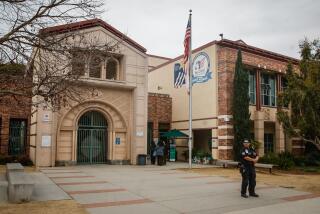Court to Study Child Pornography Law : Justices to Review Mass. Statute on Nude Photos
- Share via
WASHINGTON — The Supreme Court agreed today to decide the constitutionality of a Massachusetts pornography law that makes it a crime to photograph a child in the nude.
The court will hear arguments next term in an appeal by Massachusetts officials of a state court ruling that struck down the law.
The law states that it is a crime to allow a child under 18 to “pose or be exhibited in a state of nudity . . . for (the) purpose of visual representation or reproduction in any book, magazine, pamphlet, motion picture film, photograph or picture.”
Douglas Oakes was indicted under the law in January, 1985, by a Worcester County grand jury for taking photographs of his stepdaughter, Laurie Supernor, then 14, with her breasts partially exposed.
10-Year Sentence
He was convicted and sentenced to 10 years in prison.
On appeal, the state’s highest court, the Supreme Judicial Court, found the law was unconstitutionally over-broad and struck down the conviction and the law.
The state court, last February, ruled the law “criminalizes conduct that virtually every person would regard as lawful. (The law), for example, makes a criminal of a parent who takes a frontal view picture of his or her naked 1-year-old running on a beach or wading in a pool.”
Seeking high court review in the child pornography case, the state defended the law and said it is clear that the “behavior essentially prohibited by (the law) is criminal conduct which all states have a vital and constitutionally legitimate interest in preventing.”
The state also said Oakes’ taking of “sexually suggestive nude photographs of his 14-year-old stepdaughter” bears no resemblance to a parent’s picture of a toddler romping in a wading pool.
Conflict of Interest
In another case today, the court gave trial judges broad power to deny criminal defendants the lawyer of their choice if a possible conflict of interest exists.
The court also ruled that judges may veto a defendant’s choice of lawyers even when the defendant is willing to waive the right to conflict-free legal help.
By a 5-4 vote, the justices upheld the 1984 narcotics-trafficking conspiracy conviction of Mark Wheat, who received and stored large shipments of Mexican marijuana at his Escondido, Calif., home and then distributed the illegal drug to local customers.
Wheat, one of 23 people charged in the conspiracy, had challenged the conviction on the ground that he wrongly was denied the defense lawyer of his choice.
More to Read
Sign up for Essential California
The most important California stories and recommendations in your inbox every morning.
You may occasionally receive promotional content from the Los Angeles Times.










